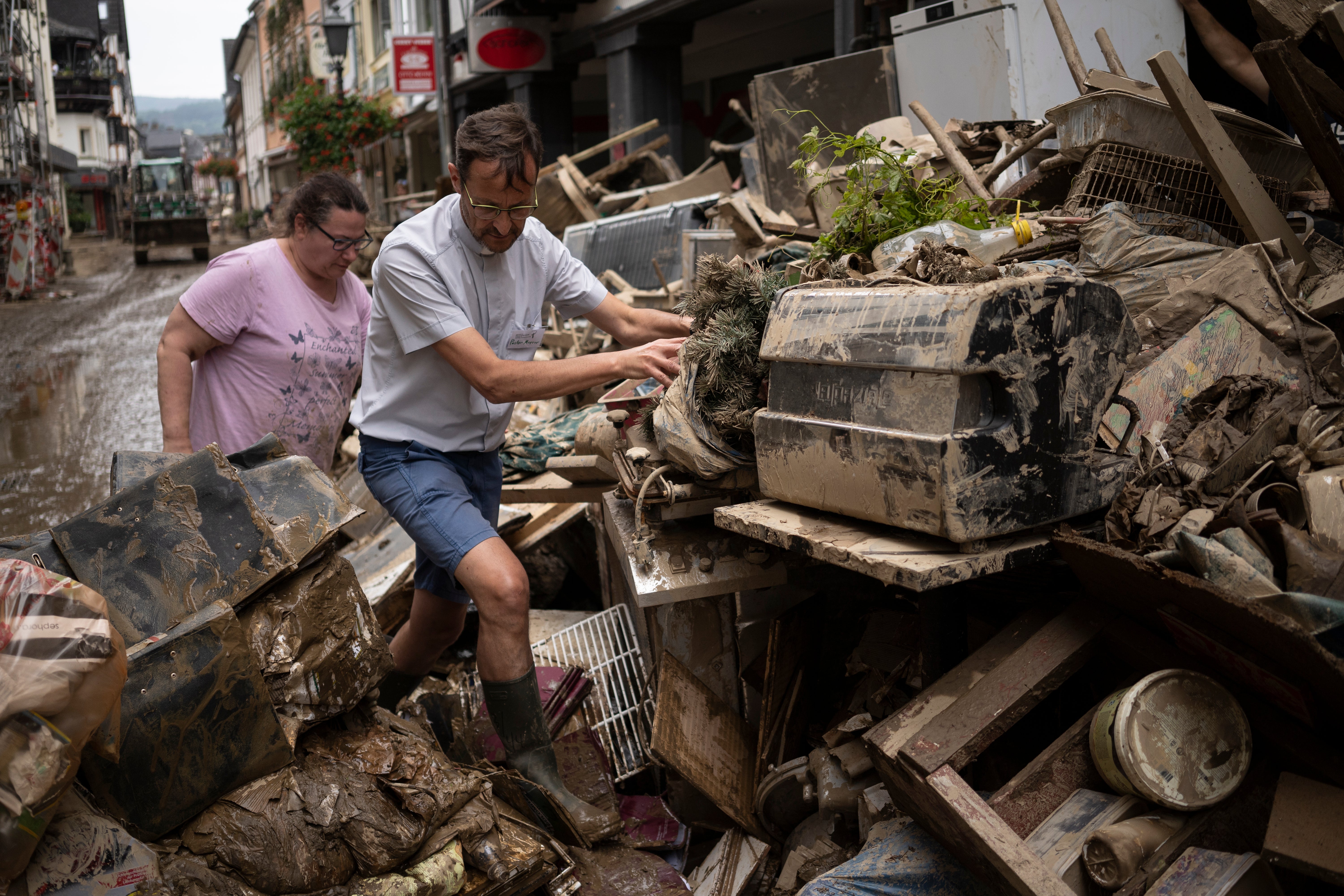In flood-hit German town, a priest struggles to give comfort
For a priest tending to his parishioners in one of the German towns hit hardest by last week's flood, giving comfort to those who have lost relatives and many of their possessions is proving to be a difficult task

Your support helps us to tell the story
From reproductive rights to climate change to Big Tech, The Independent is on the ground when the story is developing. Whether it's investigating the financials of Elon Musk's pro-Trump PAC or producing our latest documentary, 'The A Word', which shines a light on the American women fighting for reproductive rights, we know how important it is to parse out the facts from the messaging.
At such a critical moment in US history, we need reporters on the ground. Your donation allows us to keep sending journalists to speak to both sides of the story.
The Independent is trusted by Americans across the entire political spectrum. And unlike many other quality news outlets, we choose not to lock Americans out of our reporting and analysis with paywalls. We believe quality journalism should be available to everyone, paid for by those who can afford it.
Your support makes all the difference.The Rev. Joerg Meyrer steels himself before making his way through the stinking piles of mud-caked debris that permeate this once-beautiful town in Germany's wine-growing Ahr valley.
For the past five days, the 58-year-old Catholic priest has pulled on his galoshes and walked the streets to try to give comfort to his parishioners as they get on with the grim task of cleaning up what was destroyed by Wednesday's flash flood — and recovering the bodies of those who perished in it.
“It came over us like a tsunami," Meyrer recalls. “Bridges, houses, apartments, utility pipes — everything that actually constitutes this town, what it lives on, has been gone since that night.”
Residents of Ahrweiler had been told to expect the Ahr River, a tributary of the Rhine to crest at 7 meters (nearly 23 feet), but Meyrer said few comprehended what that would mean. The last serious flood in the area south of Bonn was more than a century ago.
Nearly 200 people were killed when heavy rainfall turned streams into raging torrents across parts of western Germany and Belgium and officials put the death toll in Ahrweiler county alone at 110, making it the hardest hit region.
Meyrer, who expects that figure to rise significantly, said the victims came from all walks of life.
“Old people who died in bed because they couldn’t get up or because they didn’t hear it; young people who died minutes after helping others; people who died in their car because they wanted to drive it out when the flood wave surprised them.”
Townspeople recounted grim cases of delayed grief, as the realization began to sink in that those reported missing would not return.
Meyrer said he was called in when firefighters found the body of a woman he had known well.
“The husband knew his wife had been in the basement and he had to wait two days for her to be recovered,” he said.
For now, many residents are focusing on the cleanup before dealing with the longer task of rebuilding.
“We need to start over,” said Paddy Amanatidis, the owner of La Perla pizzeria, as she took a break from cleaning the rubble out of the restaurant.
"We fought our way through (the coronavirus pandemic) and the flood won’t get us down either,” she said, adding that the solidarity shown by neighbors and friends had helped to boost spirits.
Meyrer believes that even for those lucky enough not to have lost loved ones, the enormous impact of the disaster has not fully hit them.
“When the first lot (of debris) has been cleared and people have nothing to do, then I think many will understand for the first time what they’ve lost and what that means,” he said.
German officials have rejected allegations that they failed to properly warn people of the severity of the floods, but conceded that more lessons can be learned from the disaster. Experts say global warming may make such floods even more frequent.
Upriver in the village of Schuld, which was largely destroyed, Mayor Helmut Lussi said the scars would last a long time. “Our lives changed from one day to the next,” he told German Chancellor Merkel, who visited on Sunday.
As for mourning the victims, Meyrer says that daunting task will require the help of clergy from across the town and beyond.
Aside from the sheer number of dead, authorities also must figure out where to bury them, because the local cemetery, too, was flooded, with hardly any tombstone left standing.
While the freshly renovated Gothic walls of the 13th century St. Lawrence Church remained miraculously untouched by the flooding, Meyrer plans to keep walking the streets for now, offering a helping hand, a sympathetic ear and a shoulder to cry on.
But even he is struggling, saying that prayer hasn’t come easily in the days since the disaster struck.
“I don’t have the words, the time, the peace,” he said. “I can’t do that right now.”
“In the evening I try to say, ‘Lord, somehow you have to take over now.’ That’s got to be good enough,” he added.